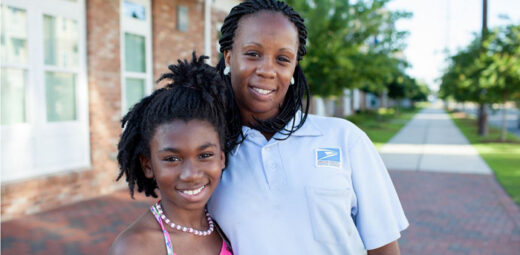
Aug 21Open Letter from Mercy Housing: Fair Housing is Social Justice, Economic Justice, and Welcome in the Suburbs
The Affirmatively Furthering Fair Housing (AFFH) provision of the 1968 federal Fair Housing Act helped fight systemic racism in housing segregation and discrimination for people of color and especially those earning low incomes. It is part and parcel of the fight for civil rights that seeks to repair the decades of discriminatory practices and racial inequities that resulted from racist zoning, lending, and tenancy policies and practices.
Across our great nation, in cities, suburbs, and rural communities — the need for safe, healthy, and affordable housing has never been greater. Housing costs are rising all across the country. The National Low Income Housing Coalition reports that a full-time worker needs to earn over $23/hr to afford a modest two-bedroom apartment (NLIHC Report). And, since the Great Recession of 2007, the need for access to affordable rental and homeownership opportunities in suburban communities is at historical highs. This is because poverty in the suburbs is at all-time highs, as documented by the Brookings Institute.
Affordable housing is needed for seniors, families, and households with disabilities. Teachers, first-responders, service, and hospitality workers all desire to live in the communities where they work. Public, civic, and business leaders recognize the value of having economic, demographic, and social diversity in suburban areas and they support the development and preservation of affordable housing through inclusionary housing policy and public investment.
Mercy Housing is the largest nonprofit owner of affordable rental housing in the country. Many of our properties are situated in suburban communities. Residents are family, friends, and neighbors. They attend local schools. They pay local taxes. And they are part of the social fabric of their communities. Investment in affordable housing, like Mercy Housing’s Grayslake Senior Residences located in Grayslake, IL a suburb of Chicago, is necessary and welcome in suburbs across the country.
Housing justice is social justice. The AFFH provision and the Fair Housing Act was born from the Civil Rights movement and was meant to create racially diverse and equitable neighborhoods. Using extensive data on demographics and living conditions, it strove to correct systemic racism — a form of hate that is not only unjust, but for communities of color and especially for Black/African American communities, it is deadly.
The President’s hurtful words on July 29, 2020, demonizing Americans earning low incomes is unacceptable. It divides a nation in need of cohesion and goes directly against the ethos, mission, and core values of Mercy Housing. To say that suburban families will be “bothered or financially hurt by having low-income housing built in your neighborhood,” fails to recognize the many hard-working families, retired seniors, and growing immigrant communities that allow suburbs to thrive socially and economically. It is unfounded and untrue.
More egregious than words, however, is the administration’s attempt to water-down the Fair Housing Act by replacing the Affirmatively Furthering Fair Housing rule with the Preserving Community and Neighborhood Choice Rule. Behind the mild-mannered title are provisions that undermine transparency and accountability of elected officials, planning boards, and city administrators.
Low-income and working-class families have the same right to housing affordable to them, in neighborhoods of opportunity, as everyone else in our community. Too often, zip codes predict a person’s life expectancy or likelihood of attending college, the results of housing discrimination. Tools like AFFH, are essential to our democracy because they foster systemic change and correct for disparate impacts of past policies and practices.
Mercy Housing has offered hope through affordable homes with services for nearly 40 years. With operations in 20 states, we find success in our dedication to neighborhoods’ health and vibrancy. We know that communities are healthy when people of all races, genders, and identities are listened to and always welcomed. They are vibrant when people, no matter their incomes, are treated with respect.
To make cities and suburbs more racially diverse, equitable, and inclusive, fair access to housing is essential. Let us seize this moment to educate rather than segregate ourselves. A person’s racial, social, or economic background should never prevent where someone is welcome or feels at home.
I ask that my fellow affordable housing advocates, concerned citizens, and lawmakers condemn the President’s recent statements about affordable housing and demand a return to the goals of the AFFH rules. I urge you to stand up to support affordable housing at this critical moment in history.
Yours in hope,
Ismael Guerrero, Mercy Housing President & CEO
No related posts.
Stay Up To Date
Get news on Mercy Housing and inspiring stories of change delivered to your inbox.


